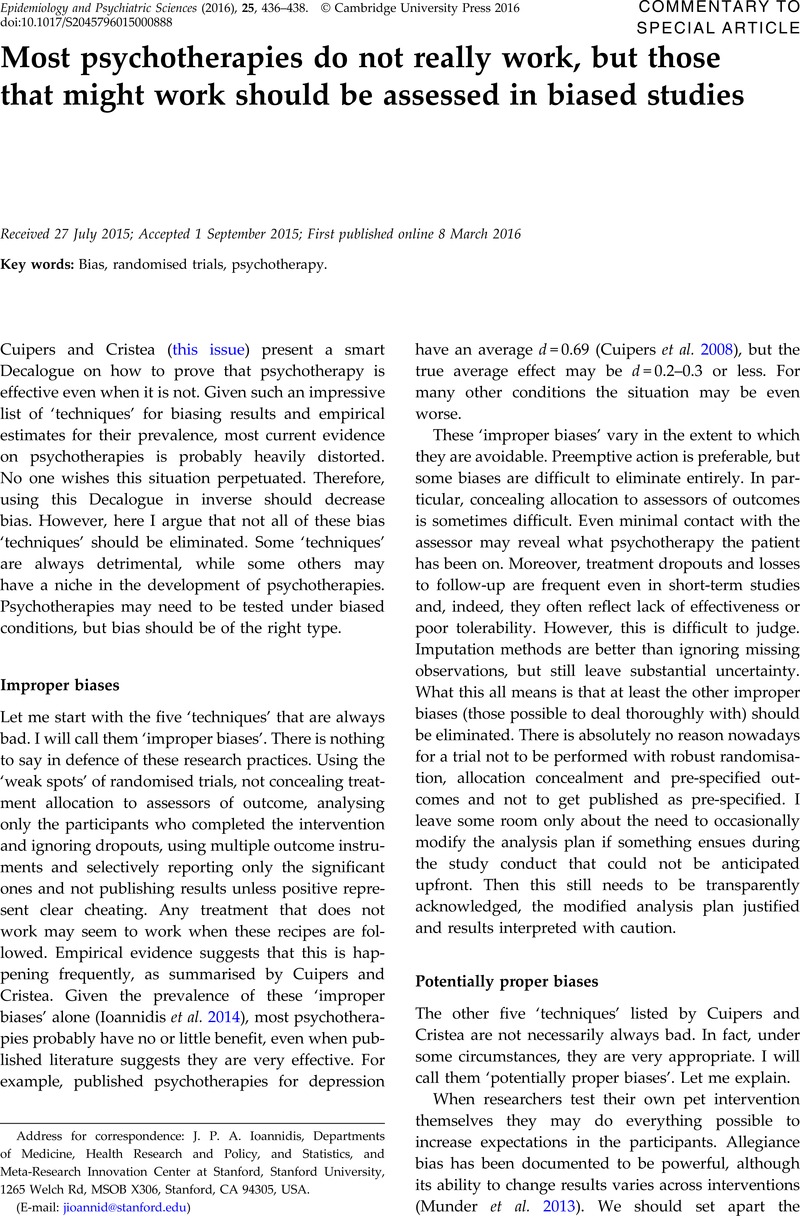Crossref Citations
This article has been cited by the following publications. This list is generated based on data provided by Crossref.
Meinlschmidt, Gunther
Lee, Jong-Hwan
Stalujanis, Esther
Belardi, Angelo
Oh, Minkyung
Jung, Eun Kyung
Kim, Hyun-Chul
Alfano, Janine
Yoo, Seung-Schik
and
Tegethoff, Marion
2016.
Smartphone-Based Psychotherapeutic Micro-Interventions to Improve Mood in a Real-World Setting.
Frontiers in Psychology,
Vol. 7,
Issue. ,
Markozannes, Georgios
Aretouli, Eleni
Rintou, Evangelia
Dragioti, Elena
Damigos, Dimitrios
Ntzani, Evangelia
Evangelou, Evangelos
and
Tsilidis, Konstantinos K.
2017.
An umbrella review of the literature on the effectiveness of psychological interventions for pain reduction.
BMC Psychology,
Vol. 5,
Issue. 1,
Gold, Stefan M
Enck, Paul
Hasselmann, Helge
Friede, Tim
Hegerl, Ulrich
Mohr, David C
and
Otte, Christian
2017.
Control conditions for randomised trials of behavioural interventions in psychiatry: a decision framework.
The Lancet Psychiatry,
Vol. 4,
Issue. 9,
p.
725.
Wagner, Christoph J.
Dintsios, Charalabos Markos
Metzger, Florian G.
L'Hoest, Helmut
Marschall, Ursula
Stollenwerk, Bjoern
and
Stock, Stephanie
2018.
Longterm persistence and nonrecurrence of depression treatment in Germany: a four‐year retrospective follow‐up using linked claims data.
International Journal of Methods in Psychiatric Research,
Vol. 27,
Issue. 2,
Cristea, Ioana A.
and
Naudet, Florian
2019.
Increase value and reduce waste in research on psychological therapies.
Behaviour Research and Therapy,
Vol. 123,
Issue. ,
p.
103479.
Yoder, Whitney Rose
Karyotaki, Eirini
Cristea, Ioana-Alina
van Duin, Daniëlle
and
Cuijpers, Pim
2019.
Researcher allegiance in research on psychosocial interventions: meta-research study protocol and pilot study.
BMJ Open,
Vol. 9,
Issue. 2,
p.
e024622.
Cristea, Ioana A.
2019.
The waiting list is an inadequate benchmark for estimating the effectiveness of psychotherapy for depression.
Epidemiology and Psychiatric Sciences,
Vol. 28,
Issue. 03,
p.
278.
Rabeyron, Thomas
2020.
Why Most Research Findings About Psi Are False: The Replicability Crisis, the Psi Paradox and the Myth of Sisyphus.
Frontiers in Psychology,
Vol. 11,
Issue. ,
Rabeyron, Thomas
2021.
L’évaluation et l’efficacité des psychothérapies psychanalytiques et de la psychanalyse.
L'Évolution Psychiatrique,
Vol. 86,
Issue. 3,
p.
455.
Price, Larry
Briley, Josh
Haltiwanger, Steve
and
Hitching, Rita
2021.
A meta-analysis of cranial electrotherapy stimulation in the treatment of depression.
Journal of Psychiatric Research,
Vol. 135,
Issue. ,
p.
119.
Pile, Victoria
Smith, Patrick
Leamy, Mary
Oliver, Abigail
Bennett, Eleanor
Blackwell, Simon E.
Meiser-Stedman, Richard
Stringer, Dominic
Dunn, Barnaby D.
Holmes, Emily A.
and
Lau, Jennifer Y.F.
2021.
A feasibility randomised controlled trial of a brief early intervention for adolescent depression that targets emotional mental images and memory specificity (IMAGINE).
Behaviour Research and Therapy,
Vol. 143,
Issue. ,
p.
103876.
Haun, Markus W.
Tönnies, Justus
Krisam, Regina
Kronsteiner, Dorothea
Wensing, Michel
Szecsenyi, Joachim
Vomhof, Markus
Icks, Andrea
Wild, Beate
Hartmann, Mechthild
and
Friederich, Hans-Christoph
2021.
Mental health specialist video consultations versus treatment as usual in patients with depression or anxiety disorders in primary care: study protocol for an individually randomised superiority trial (the PROVIDE-C trial).
Trials,
Vol. 22,
Issue. 1,
Blackwell, Simon E
and
Woud, Marcella L
2022.
Making the leap: From experimental psychopathology to clinical trials.
Journal of Experimental Psychopathology,
Vol. 13,
Issue. 1,
Ware, John W
Venere, Kenny
Miller, Stephanie A
Freeman, Heather
Scalzitti, David A
and
Hoogeboom, Thomas
2023.
A Systematic Appraisal of Conflicts of Interest and Researcher Allegiance in Clinical Studies of Dry Needling for Musculoskeletal Pain Disorders.
Physical Therapy,
Vol. 103,
Issue. 6,
Lawless, William
and
Moskowitz, Ira S.
2024.
Shannon Holes, Black Holes, and Knowledge: The Essential Tension for Autonomous Human–Machine Teams Facing Uncertainty.
Knowledge,
Vol. 4,
Issue. 3,
p.
331.




Target article
How to prove that your therapy is effective, even when it is not: a guideline
Related commentaries (2)
A guideline for whom?
Most psychotherapies do not really work, but those that might work should be assessed in biased studies